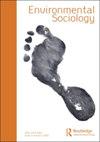Sociologies of climate change are not enough. Putting the global biodiversity crisis on the sociological agenda
IF 2.8
Q3 ENVIRONMENTAL STUDIES
引用次数: 1
Abstract
In December 2022, the 15 meeting of the Conference of the Parties (COP15) to the UN Convention on Biological Diversity adopted what was described in the official press release as a ‘historic package of measures deemed critical to addressing the dangerous loss of biodiversity and restoring natural ecosystems’ (CBD 2022). These included protection of at least 30% of the world’s lands, inland waters, coastal areas, and oceans by 2030 (thereby endorsing the ‘global deal for nature’ or 30 × 30 initiative proposed by Dinerstein et al. 2019) along with restoration complete or under way on at least 30% of degraded terrestrial and aquatic ecosystems and a suite of other goals and targets. I will outline these in a little more detail below. However, my aim in this essay is not to provide a comprehensive overview of the agreed KunmingMontreal Global Biodiversity Framework but to consider its implications for sociology and cognate social sciences – to ask how signing of this ‘landmark agreement’ might inform research agendas, and the practical contribution of sociology to more just and sustainable futures.仅仅对气候变化进行社会学研究是不够的。将全球生物多样性危机列入社会学议程
2022年12月,《联合国生物多样性公约》第15次缔约方大会(COP15)通过了官方新闻稿中所称的“解决生物多样性危险丧失和恢复自然生态系统至关重要的历史性一揽子措施”(CBD 2022)。其中包括到2030年保护世界上至少30%的土地、内陆水域、沿海地区和海洋(从而支持Dinerstein等人于2019年提出的“全球自然协议”或30 × 30倡议),同时完成或正在恢复至少30%退化的陆地和水生生态系统,以及一系列其他目标和指标。我将在下面更详细地概述这些。然而,我在这篇文章中的目的并不是对《昆明-蒙特利尔全球生物多样性框架》提供一个全面的概述,而是考虑它对社会学和相关社会科学的影响——询问这一“里程碑式协议”的签署可能如何为研究议程提供信息,以及社会学对更公正和可持续的未来的实际贡献。
本文章由计算机程序翻译,如有差异,请以英文原文为准。
求助全文
约1分钟内获得全文
求助全文
来源期刊

Environmental Sociology
ENVIRONMENTAL STUDIES-
CiteScore
4.60
自引率
12.00%
发文量
34
期刊介绍:
Environmental Sociology is dedicated to applying and advancing the sociological imagination in relation to a wide variety of environmental challenges, controversies and issues, at every level from the global to local, from ‘world culture’ to diverse local perspectives. As an international, peer-reviewed scholarly journal, Environmental Sociology aims to stretch the conceptual and theoretical boundaries of both environmental and mainstream sociology, to highlight the relevance of sociological research for environmental policy and management, to disseminate the results of sociological research, and to engage in productive dialogue and debate with other disciplines in the social, natural and ecological sciences. Contributions may utilize a variety of theoretical orientations including, but not restricted to: critical theory, cultural sociology, ecofeminism, ecological modernization, environmental justice, organizational sociology, political ecology, political economy, post-colonial studies, risk theory, social psychology, science and technology studies, globalization, world-systems analysis, and so on. Cross- and transdisciplinary contributions are welcome where they demonstrate a novel attempt to understand social-ecological relationships in a manner that engages with the core concerns of sociology in social relationships, institutions, practices and processes. All methodological approaches in the environmental social sciences – qualitative, quantitative, integrative, spatial, policy analysis, etc. – are welcomed. Environmental Sociology welcomes high-quality submissions from scholars around the world.
 求助内容:
求助内容: 应助结果提醒方式:
应助结果提醒方式:


